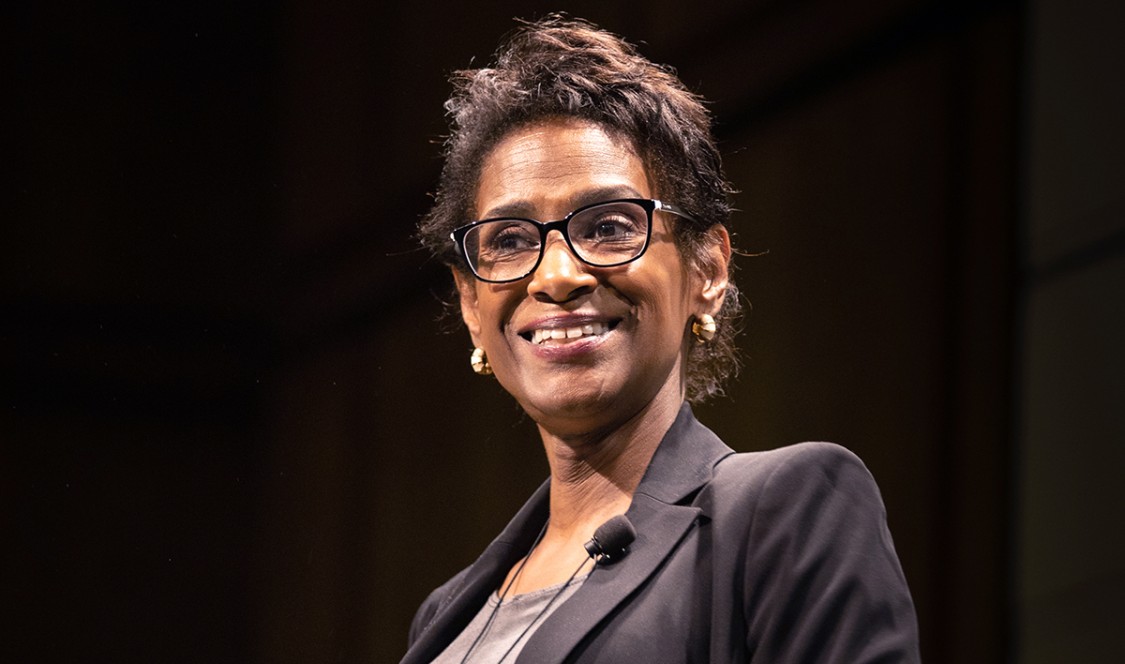It was an historic moment full of public dread and anxiety. But in the deepest chasm of the Great Depression, President Franklin Roosevelt delivered a quintessential expression of hopeful imagination.
During his first inaugural address, he famously told the nation, “The only thing we have to fear is fear itself.”
“This is a remarkable and especially striking instance of imaginative reframing,” said Michele Moody-Adams, Columbia University professor of political philosophy and legal theory during her recent presentation at the Marian Miner Cook Athenaeum. “Roosevelt takes what would have been the familiar response and renames it as unjustified, nameless.”
In so doing, Roosevelt sparked a national commitment to constructive change, Moody-Adams said at her talk— “How Imagination Creates Space for Social Progress.”
Throughout her presentation and Q&A, Moody-Adams built a powerful case for imagination as a means for addressing a host of social challenges—from economic inequality to LGBTQ rights and sexual harassment to climate change.
“Through the exercise of imagination, human beings can generate ideas, images, stories, and experiences that present unfamiliar possibilities and stimulate novel reflections on what’s actual and familiar,” said Moody-Adams, author of Fieldwork in Familiar Places: Morality, Culture and Philosophy.
Moody-Adams argued that imagination can prompt advances in problem solving, empirical knowledge, and moral understanding.
Visionary orators like Roosevelt, Martin Luther King Jr., and Abraham Lincoln “invite us to treat occasions of social uncertainty, even social crisis, as opportunities to imagine new and better moments of social life,” Moody-Adams said. But there are also examples of transformative imagination in art, such as Harriet Beecher Stowe’s anti-slavery novel Uncle Tom’s Cabin, Picasso’s anti-war painting Guernica, Billie Holiday’s protest lamentation in the song Strange Fruit, and Margaret Atwood’s dystopian novel The Handmaid’s Tale.
Where data and facts can fail to dislodge biases, these artful expressions of imagination can bring “a particular focus on affirming the humanity of the stigmatized ‘other’ and consideration of important details of experience,” Moody-Adams said.
The political philosopher acknowledged that constructive imagination isn’t an effective strategy for social change unless it builds on collaboration. Never underestimate the importance of sacrifice, suffering, and struggle, she counseled.
“Imagination is socially constructive not just because of what happens in any individual brain, but because of the ways communities of concern and action enable its constructive exercise,” she said. “The power of Uncle Tom’s Cabin was clearly a function of its connection to the arguments and actions of abolitionists. The civil rights movement was not the work of one leader but built on the collective of more than a century of African-American struggle.”
Moody-Adams also noted that imagination doesn’t provide a swift path to change—just a preferable one.
“Revolution is a funny thing—when it’s extremely quick and extremely violent, sometimes what it produces is not stable,” she said. “I contend that nonviolent change can last longer, because (those involved) have had to engage in coordinated actions. They’ve had to make their protest and dissent constructive. The binds that connect are stronger.”
During the Q&A portion of the evening, Moody-Adams faced some pointed questioning about her contention that “constructive imagination and not ideology is the way, if you want nonviolent, non-coercive social change.”
CMC philosophy and math major Mohnish Shah ’20, who studies with philosophy professor Amy Kind, said his class so far has “focused a lot on ideology, and we are of the assumption that your imagination is limited by your experience.”
But Shah added that he found the discussion on imagination persuasive.
“I heard a perspective I had not heard before—one that centers on an objective truth and imagination’s ability to arrive at that,” he said. “I learned a lot. It’s definitely something I’ll think about when I go to bed tonight.”
—Dennis Arp

